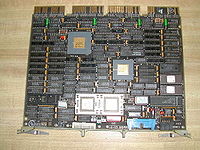Difference between revisions of "KDJ11-B CPU"
m (Jnc moved page KDJ11-B to KDJ11-B CPU: follow scheme of adding function to name) |
m (fix PMI link) |
||
| Line 3: | Line 3: | ||
The '''KDJ11-B''' CPU board (M8190) is the second-generation [[QBUS]] [[CPU]] card using the [[J-11]] chip of the [[PDP-11]] (the first being the the [[KDJ11-A]]). It is a [[DEC card form factor|quad-height]] board, and is used in the [[PDP-11/83]] and [[PDP-11/84]] systems. | The '''KDJ11-B''' CPU board (M8190) is the second-generation [[QBUS]] [[CPU]] card using the [[J-11]] chip of the [[PDP-11]] (the first being the the [[KDJ11-A]]). It is a [[DEC card form factor|quad-height]] board, and is used in the [[PDP-11/83]] and [[PDP-11/84]] systems. | ||
| − | Its principal improvement over the KDJ11-A is its support of the [[Private Memory Interconnect | + | Its principal improvement over the KDJ11-A is its support of the [[Private Memory Interconnect]] bus, a high-performance variant of the QBUS; it also supports the [[KTJ11-B]], a QBUS->[[UNIBUS]] adaptor. |
It also provides a built-in serial console, and [[ROM]]s to contain diagnostic and boot programs, and an [[EEPROM]] to contain configuration information. | It also provides a built-in serial console, and [[ROM]]s to contain diagnostic and boot programs, and an [[EEPROM]] to contain configuration information. | ||
Revision as of 15:37, 5 June 2016
The KDJ11-B CPU board (M8190) is the second-generation QBUS CPU card using the J-11 chip of the PDP-11 (the first being the the KDJ11-A). It is a quad-height board, and is used in the PDP-11/83 and PDP-11/84 systems.
Its principal improvement over the KDJ11-A is its support of the Private Memory Interconnect bus, a high-performance variant of the QBUS; it also supports the KTJ11-B, a QBUS->UNIBUS adaptor.
It also provides a built-in serial console, and ROMs to contain diagnostic and boot programs, and an EEPROM to contain configuration information.
Like the KDJ11-A, the -B also contains an 8K-byte write-through cache (set size 1, block size 1 16-bit word), protected by parity; the KDJ11-B additionally provides two sets of tag fields for each cache entry, so that the CPU and DMA from the QBUS can interact with the cache simultaneously. Again, cache control logic inspects DMA transfers and invalidates cache entries for memory which is written to by a device.
Also like the KDJ11-A, it can also use the FPJ11 Floating Point Accelerator to speed up the FP11 implementation in the J-11.
| v • d • e PDP-11 Computers and Peripherals |
|---|
| UNIBUS PDP-11s - PDP-11/20 • PDP-11/15 • PDP-11/35 • PDP-11/40 • PDP-11/45 • PDP-11/50 • PDP-11/55 • PDP-11/70 PDP-11/05 • PDP-11/10 • PDP-11/04 • PDP-11/34 • PDP-11/60 • PDP-11/44 • PDP-11/24 • PDP-11/84 • PDP-11/94 QBUS PDP-11s - PDP-11/03 • PDP-11/23 • PDP-11/23+ • MicroPDP-11/73 • MicroPDP-11/53 • MicroPDP-11/83 • MicroPDP-11/93 QBUS CPUs: LSI-11 • LSI-11/2 • KDF11-A • KDF11-B • KDJ11-A • KDJ11-B • KDJ11-D • KDJ11-E Buses: UNIBUS • UNIBUS map • SPC • MUD • EUB • QBUS • CD interconnect • PMI Also: PDP-11 architecture • PDP-11 Extended Instruction Set • FP11 floating point • PDP-11 Memory Management |
| UNIBUS CPUs: KA11 • KC11 • KB11-A • KB11-B • KB11-C • KB11-D • KD11-A • KD11-B • KD11-D • KD11-E • KD11-EA • KD11-K • KD11-Z • KDF11-U
Co-processors: FP11-A • FP11-B • FP11-C • FP11-E • FP11-F • KE44-A • FPF11 Chips: LSI-11 • KEV11-A • KEV11-B • KEV11-C • F-11 • KEF11-A • KTF11-A • T-11 • J-11 • FPJ11 CPU options: KE11-E • KE11-F • KJ11-A • KT11-C • KT11-D • KK11-A • KK11-B • KT24 • KTJ11-B Rare CPU options: KS11 Memory Protection and Relocation option • KT11-B Paging Option • KUV11 Writeable Control Store Front panels: KY11-A • KY11-D • KY11-J • KY11-LA • KY11-LB • KY11-P More on buses: UNIBUS and QBUS termination • Bus Arbitration on the Unibus and QBUS • CTI BUS PDT-11s - PDT-11/110 • PDT-11/130 • PDT-11/150 CTI PDP-11s - PRO-325 • PRO-350 • PRO-380 Other: FIS floating point • PDP-11 Commercial Instruction Set • PDP-11 stacks • PDP-11 family differences |
